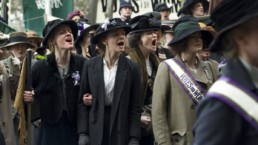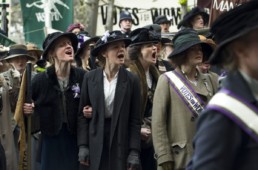Review: ‘Suffragette’
A solid performance that balances subtlety and strength, Carey Mulligan fights for women's rights in the drama, 'Suffragette'.
When a woman President could very well be the future of America, it’s hard to believe that less than 100 years ago, we were banned from participating in any and all political activities. While essentially only considered as “somebody’s wife,” women who went against the grain and fought publicly for equal rights were called suffragettes. Director Sarah Gavron (Brick Lane) and screenwriter Abi Morgan (The Iron Lady) bring this all-too-important story about women (and made by women), to life in Suffragette.
Blending fact with fiction, Suffragette tells the story of the strong-willed women in Britain who, in 1912, took a stand against the current political state to demand equal rights. They were rebels, activists, and heroes. When their peaceful protests were ineffective, these women turned to more public and violent displays to seek attention for their cause. Breaking windows and blowing up mailboxes became regular suffragette actions, citing that, “War is the only language men listen to.”
While the main character in this story is fictional, Maud Watts serves as a representation of all young women and mothers who joined the political revolution. In a solid performance that balances subtlety and strength, Carey Mulligan plays the 24-year-old Watts, spending her days working in a factory laundering clothes for far less pay than her male counterparts. When she gets swept up by her friend and fellow suffragette, Violet Miller (Anne-Marie Duff), Watts can’t help but fall under the spell of their passion. The mystique of women like Edith Ellyn (Helena Bonham Carter) and the movement’s worshiped leader Emmeline Pankhurst (Meryl Streep) are appealing, but as Watts soon learns the hard way, she is going to have to sacrifice the life she knew for the life she wants.
The mystique of women like Edith Ellyn (Helena Bonham Carter) and the movement’s worshiped leader Emmeline Pankhurst (Meryl Streep) are appealing, but as Watts soon learns the hard way, she is going to have to sacrifice the life she knew for the life she wants.
Maud is a fictionalized portrayal of one such suffragette who endured years of unfair treatment, yet one real woman who deserves recognition and, unfortunately, doesn’t get nearly enough is Emily Wilding Davison. Davidson can barely be considered a supporting character, yet it was her courage and decision to sacrifice her life for the movement that gave the suffragettes a worldwide platform to ultimately spark the change. Davidson famously walked in front of a horse at the Epsom Derby in 1913, drawing attention to the political movement. Her death made national headlines and was credited as the turning point for women’s rights. However, her death is but a fleeting moment in the film and while the film’s credits give more explanation into the subsequent effects of her actions, the lack of additional backstory into who she was onscreen seems like an obvious and terrible oversight.
The trendy cinematography is greatly appreciated as it juxtaposes the film’s historical setting and time period. What could have been moments of monotony and dullness are spiced up with hand-held, naturalistic shots that thrust the audience into the middle of the riots and transport us from our seats to the scene. Its attempt to connect with a younger audience can also be seen in the film’s poster- hot pink (almost Hot Topic-esque) graphic lettering seems like an interesting pairing next to the pale and muted photo of the film’s three stars.
While an Oscar nomination is indeed being floated around for Mulligan, the trailer alone is enough to send chills down the spine thanks to the haunting rendition of Fleetwood Mac’s ‘Landslide’, Suffragette as a whole lacks finality on the part of its lead. With a far too brief appearance from Meryl Streep in a blink-and-you’ll-miss-her scene, Watts’ story is also short-changed. Mulligan’s ability to portray so much through subtext and facial reactions makes her wonder to watch on screen, and it feels unfair to both the audience and Watts herself in the decision to forgo tying up the loose ends. The breakup of her family never finds reconciliation, which is a hard pill to swallow after such emotional scenes show her as a highly devoted and loving mother.
Suffragette likely won’t be at the top of the list for those looking for a potential date night movie, as it’s definitely not a light feel-good film. However, if you’re looking for inspiration, education or a quality cinematic experience, look no further than here. At the film’s end, a fleeting title card notes the dates that women were given the right to vote in various countries. This was met with some audible laughter from fellow critics who may have seen the obvious overlook, as it notes that all women in the US were given the right to vote in 1920. This fact is only true for white women, as black women weren’t given the same right for another 35 years. However, the film did receive applause as the credits started to roll, so if Gavron’s intent in telling the story of the suffragette movement was to inspire this generation into action and remind audiences that “Deeds, not words” get things done, then by all accounts has she succeeded.
Suffragette opens at the Landmark this Friday.
Morgan Rojas
Certified fresh. For disclosure purposes, Morgan currently runs PR at PRETTYBIRD and Ventureland.


